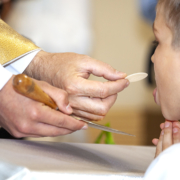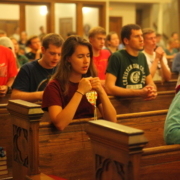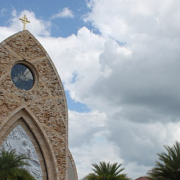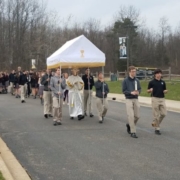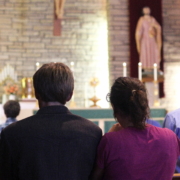Editor’s Note
This article is based on a presentation that the author made as part of a May 21, 2014, symposium on student life issues, entitled “Striving for Excellence as Student Life Leaders,” sponsored by The Cardinal Newman Society. Student life leaders at Catholic colleges and universities across the nation face the challenge of caring for the corporal and pastoral needs of their students, while assisting in their development of a personal relationship with Jesus Christ. Pastoral care and evangelization are essential to the delivery of services traditionally encompassed under the umbrella of student life issues, particularly with regard to the manner in which student life personnel engage students of a Catholic university. The emphasis of the university as “Catholic” reinforces its purpose of striving for holiness and sanctification. This is accomplished by all members of the university community integrating their faith within their daily lives. From resident hall directors to athletic coaches to faculty members, every person charged with interacting with students has the opportunity to bring Christ to the student through that encounter. Living and sharing the faith requires each agent of the New Evangelization to be bold, connected with the Church, her Gospel, and her pastoral presence, with a sense of urgency to bring others to Christ.
Introduction
At Franciscan University we are truly blessed that so many members of our University community are actively engaged in the faith and have that deep desire to respond to the Lord’s Great Commission to the apostles that is set forth in the final verses of Matthew’s Gospel: “Go, therefore, and make disciples of all nations, baptizing them in the name of the Father, and of the Son, and of the holy Spirit, teaching them to observe all that I have commanded you. And behold, I am with you always, until the end of the age.” (Mt 28:19-20). Similar to any educational institution, teaching is an important component of our daily lives, particularly for those of us who have dedicated our lives to the classroom setting. But, each one of us has the additional obligation to teach about Jesus Christ. Each one of us has the obligation to preach the Good News. We do this with our words. We do this with our actions. We do this in response to the Great Commission with which we have been charged by virtue of our baptism.
It is especially appropriate that we consider topics such as the importance of proclaiming the Gospel in light of our recent celebration of the Year of Faith, which Benedict XVI, now Pope Emeritus, called for all members of the Christian faithful. In paragraph 7 of his apostolic letter Porta fidei, which announced the Year of Faith, Benedict invited all Christians to personally grow in faith, so that we might, in turn, evangelize others. He states:
[I]t is the love of Christ that fills our hearts and impels us to evangelize. Today as in the past, he sends us through the highways of the world to proclaim his Gospel to all the peoples of the earth (cf. Mt 28:19). Through his love, Jesus Christ attracts to himself the people of every generation: in every age he convokes the Church, entrusting her with the proclamation of the Gospel by a mandate that is ever new. Today too, there is a need for stronger ecclesial commitment to new evangelization in order to rediscover the joy of believing and the enthusiasm for communicating the faith. In rediscovering his love day by day, the missionary commitment of believers attains force and vigour that can never fade away. Faith grows when it is lived as an experience of love received and when it is communicated as an experience of grace and joy. It makes us fruitful, because it expands our hearts in hope and enables us to bear life-giving witness: indeed, it opens the hearts and minds of those who listen to respond to the Lord’s invitation to adhere to his word and become his disciples. Believers, so Saint Augustine tells us, “strengthen themselves by believing”. The saintly Bishop of Hippo had good reason to express himself in this way. As we know, his life was a continual search for the beauty of the faith until such time as his heart would find rest in God.
As Benedict reminds us, our own faith grows when we live it out as an experience of the love that we have received from God. The more we embrace God’s love for us, the more our faith will grow. Furthermore, our faith, which is rooted in love, expands our hearts and enables us to witness to others of the importance of what we believe.
In his recent apostolic exhortation, Evangelii gaudium, Pope Francis presents a similar idea. Francis maintains:
We become fully human when we become more than human, when we let God bring us beyond ourselves in order to attain the fullest truth of our being. Here we find the source and inspiration of all our efforts at evangelization. For if we have received the love which restores meaning to our lives, how can we fail to share that love with others?
How can we fail to share with others the love of God which restores meaning to our lives?
If we open our hearts and minds to truly listen to the Lord we are able to respond to His invitation to follow Him as His disciples. We, as believers, are strengthened by believing and, in turn, we are strengthened so that we can spread the Gospel to others.
This article will address the role of pastoral care and evangelization in the area of student life affairs. At Franciscan University of Steubenville, as I would anticipate at each Catholic university, pastoral care and evangelization are important components of how we engage our students in developing a personal relationship with Jesus Christ and also to reach out to many persons other than those who are enrolled as current students. Perhaps such issues are addressed primarily in campus ministry departments or by the Chaplain for a Catholic university. But I propose that pastoral care and evangelization are also essential to the delivery of services traditionally encompassed under the umbrella of student life issues, particularly with regard to the manner in which student life personnel engage students of a Catholic university. Of course, this paradigm necessarily begins with a recognition by student life personnel of their own need to grow in faith, to develop their personal relationship with Christ, and to be continuously converted to the Lord.
In his apostolic constitution Ex corde Ecclesiae, now Saint John Paul II did not dedicate specifically a portion of his constitution to student life issues. He did, however, provide guidance on topics that are closely related to what we understand in the United States as “student affairs” or “student life” issues. Ex corde Ecclesiae addresses both pastoral care and evangelization – topics that are certainly related to student life issues and which are also treated in Pope Francis’ apostolic exhortation Evangelii gaudium. Both documents provide to those who minister in the area of student life assistance with regard to how pastoral care and evangelization ought to be incorporated into their daily activities. We begin with the role of pastoral care in student life.
The Importance of Pastoral Care in Student Life
The Catholic university is described as an “academic community” that seeks to protect and advance the dignity of the human person through research, teaching and other activities in communities at the local, national and international levels. Each Catholic university, since it is in fact Catholic, must embrace the following essential characteristics:
- A Christian inspiration not only of individuals but of the university community as such;
- A continuing reflection in the light of the Catholic faith upon the growing treasury of human knowledge, to which it seeks to contribute by its own research;
- Fidelity to the Christian message as it comes to us through the Church;
- An institutional commitment to the service of the people of God and of the human family in their pilgrimage to the transcendent goal which gives meaning to life.
As Saint John Paul II maintained, a Catholic university is certainly a community of scholars that advances the various branches of academic studies. But it is also an educational institution that embraces and advances the principles of Catholicism as a defining component of what it was established to be as a “Catholic university”. Consequently, Catholic ideals ought to permeate all activities of a Catholic university.
The emphasis on the university as “Catholic” promotes a Catholic university’s purpose. At its core, a Catholic university is to strive for holiness and sanctification. It does so through participation of members of the University community in the sacramental life of the Church. It also does so by promoting the teachings of the Catholic Church in a manner that delivers an authentically Catholic education. The community of a Catholic university is unique because its focus on Christ enables the community to promote the university’s Catholic identity. Saint John Paul II said:
A Catholic university pursues its objectives through its formation of an authentic human community animated by the spirit of Christ. The source of its unity springs from a common dedication to the truth, a common vision of the dignity of the human person, and ultimately, the person and message of Christ, which gives the institution its distinctive character. As a result of this inspiration, the community is animated by a spirit of freedom and charity; it is characterized by mutual respect, sincere dialogue and protection of the rights of individuals. It assists each of its members to achieve wholeness as human persons; in turn, everyone in the community helps in promoting unity, and each one, according to his or her role and capacity, contributes towards decisions which affect the community, and also towards maintaining and strengthening the distinctive Catholic character of the institution.
Saint John Paul II went on to broadly define pastoral ministry as “that activity of the University which offers the members of the university community an opportunity to integrate religious and moral principles with their academic study and non-academic activities, thus integrating faith with life.” Because of their accessibility to students, student life staff members are in a position to help them to integrate “faith with life”, giving a “practical demonstration of its faith in its daily activity.”
Pastorally delivered care at all levels of a Catholic university provides the members of the university community with the opportunity to integrate their faith into their daily lives in the residence halls, the many and various activities that are student oriented, such as athletics, clubs or associations, or even in dealing with issues of student discipline. Residence hall directors and assistants physically live with the students and see them engage their spiritual highs and lows. Athletic coaches also meet the members of their teams on a daily basis for practice or on the long bus trip for an away game. Even the person at a Catholic university charged with meeting with students who have participated in some action that might lead to discipline has the opportunity to bring Christ to that student through their encounter.
At a Catholic university, there are also numerous occasions throughout the day for prayer and reflection. By engaging in such opportunities, student life personnel are able to bring to prayer the challenges they experience in their ministry and to, in turn, bring back to their ministry the insights that they receive in prayer. Saint John Paul II said that, “Catholic members of this community will be offered opportunities to assimilate Catholic teaching and practice into their lives and will be encouraged to participate in the celebration of the sacraments, especially the Eucharist as the most perfect act of community worship.” Through their words and example, student life representatives are also able to encourage other members of the University community to engage in these various spiritual opportunities.
In striving for excellence, student life personnel help members of a Catholic university community entrusted to their care to become more aware of the struggles of the poor and those that society has forgotten. In the various formation activities available in the residence halls or through participation in missionary outreach activities, student life representatives prepare students for active participation in the life of Church. Students should “become more aware of their responsibility towards those who are suffering physically or spiritually” beginning with those within their own academic community and carrying to our brothers and sisters in need who live beyond the University community. Students can also be assisted in becoming more aware of their particular vocation in life, whether it is to be married or to remain single, to be ordained or to be consecrated as a religious. There are many opportunities for student life staff to help the members of the University community entrusted to their care to be formed about the various vocations in the Church and to help students hear and respond to God’s special call for their lives. At Franciscan University of Steubenville, we are blessed to have chapels in our residence halls where the Blessed Sacrament is reserved. This allows the residents the opportunity throughout the course of the day – and even into the late night – for quiet time and reflection to discern God’s plan for them. Each residence hall also has a chaplain who is available at designated times throughout the week to offer spiritual direction or, in the case of priest chaplains, the sacrament of reconciliation. Forming faith sharing groups and encouraging participation in devotional exercises are just a few additional ways that student life representatives can assist students with their discernment.
Thus, at a Catholic university, pastoral care is not limited to the activities that go on in the university chapel. Pastoral care should not be separated from other aspects of university life. Pastoral ministry is integral to the university community and enhances the totality of a student’s university experience since faith is not an ancillary activity. Faith is constitutive of a Catholic university. Pastoral care is essential to the life of the university that is Catholic. The University’s focus on the spiritual development of the members of the University community is of primary importance in promoting the Catholic character of the institution.
Conclusion on Pastoral Ministry
There are many opportunities to provide pastoral care in the student life arena. On a daily basis, each person who is part of the Catholic university community has the chance to be the presence of Christ to the people that God has entrusted to their care. The action of being pastoral is itself a powerful invitation to evangelization, the topic to which we now turn.
The Importance of Evangelization in Student Life
In Ex corde Ecclesiae, Saint John Paul II also reflected on the importance of evangelization. He said: “The primary mission of the Church is to preach the Gospel in such a way that a relationship between faith and life is established in each individual and in the socio-cultural context in which individuals live and act and communicate with one another.” In Evangelii gaudium, Pope Francis indicates that “the primary reason for evangelizing is the love of Jesus which we have received.” Evangelization according to these principles should also be the goal of a student life department at a Catholic college or university since “each Catholic university makes an important contribution to the Church’s work of evangelization.”
Throughout the pontificates of Popes John Paul II and Benedict XVI, and now Francis, we have learned about the ongoing development of what is referred to as the New Evangelization. Pope Francis encourages “the Christian faithful to embark upon a new chapter of evangelization, marked by … joy, while pointing out new paths for the Church’s journey in years to come.” In an attempt to describe the various components of the New Evangelization, one commentator suggested:
In essence, New Evangelization is comprised of three things: First, New Evangelization includes renewed spiritual devotion as well as renewed efforts in catechesis. We must know Jesus, and we must understand Christianity and the Catholic faith in particular. This renewed knowledge enables the second element, living our faith. And third, a natural extension of knowing and living our faith is to share it with others.
Thus, the three key components of the New Evangelization are: personal renewal or conversion; living the faith; and sharing the faith with others. We begin with conversion.
Conversion
At Franciscan University we are familiar with the conversion of Saint Francis of Assisi. Francis, who had grown up with many fine things in his life and had many opportunities before him, gradually became unsure of whether he was living his life in the way that God had planned for him. Later in his life, Francis wrote in his Testament:
The Lord gave me, Brother Francis, thus to begin doing penance in this way: for when I was in sin, it seemed too bitter for me to see lepers. And then the Lord Himself led me among them and I showed mercy to them. And when I left them, what had seemed bitter to me was turned into sweetness of soul and body. And afterwards I delayed a little and left the world.
Thus, according to Francis, it was his encounters with the lepers that led to his conversion. Being able to show mercy and compassion to the men and women whom society had forgotten caused Francis to reflect on his life. This reflection led to the deepening of his relationship with Christ. In his biography of Francis, Augustine Thompson, O.P. expounds upon these interactions and writes that Francis’
experience with [the lepers] had nothing to do with choices between wealth and poverty, knightly pride and humility, or even doing service instead of conducting business. It was a dramatic personal reorientation that brought forth spiritual fruit. As Francis showed mercy to these outcasts, he came to experience God’s own gift of mercy to himself. As he cleaned the lepers’ bodies, dressed their wounds, and treated them as human beings, not as refuse to be fled from in horror, his perceptions changed. What before was ugly and repulsive now caused him delight and joy not only spiritually, but also viscerally and physically. Francis’s aesthetic sense, so central to his personality, had been transformed, even inverted. The startled veteran sensed himself, by God’s grace and no power of his own, remade into a different man. Just as suddenly, the sins that had been tormenting him seemed to melt away, and Francis experienced a kind of spiritual rebirth and healing. Not long after this encounter, later accounts tell us … that Francis was walking down a road and met one of these same lepers. He embraced the man in his arms and kissed him. Francis’s spiritual nightmare was over; he had found peace.
His spiritual nightmare was over. In being merciful, Francis came to know and accept God’s mercy. And that led to healing. That led to peace. Francis came to understand what Christ was asking him to do. With this renewed devotion to Christ, Francis’ life was changed and he felt compelled to leave behind his possessions and attachments to preach the Good News to others.
Although Francis linked his conversion with his encounters with the lepers, his conversion did not end there. Francis continued daily in his quest to encounter Christ and to draw closer to Christ. He focused on ongoing conversion throughout his entire life, seeking to redirect himself toward God and to draw others to Christ. Francis became so directed towards Christ that later on in his life he even bore the wounds of Christ on his own body.
Each of us has a story to tell about our encounter with Christ. Our own ongoing conversion must include the act of “turning away” from sin and those things that distract us from our pursuit of holiness. Going to confession and to Mass, or participating in Holy Hours, can only be effective for us if we are in fact “turning away” from those things that keep us from God. Members of a Catholic university community should focus their daily activities on Christ and turning towards Christ. Ongoing conversion is at the heart of being an authentic agent of the New Evangelization and, for that matter, at the heart of being Christian.
Our own encounter with Christ would lose its significance if we did not allow it to transform us in a way that leads us closer to Christ. Conversion demands a response. Conversion demands the transformation of our lives. Conversion causes us to share the fruits of conversion with others. As we draw closer to Christ, we need to share that gift with others through missionary action and through evangelization.
Pope Francis reminds us that:
An evangelizing community knows that the Lord has taken the initiative, he has loved us first, and therefore we can move forward, boldly take the initiative, go out to others, seek those who have fallen away, stand at the crossroads and welcome the outcast. Such a community has an endless desire to show mercy, the fruit of its own experience of the power of the Father’s infinite mercy.
Thus personal conversion leads to participation in the New Evangelization on many levels. Personal conversion fosters a renewed spiritual devotion. It causes the follower of Christ to live the faith more authentically. And it demands that faith is to be shared with others. We may never encounter a leper as part of our conversion, but the focus on personal conversion that enables us to live the faith that we hand on to others is essential to the New Evangelization. The same is true for student life representatives. A life focused on ongoing conversion is at the root of being an authentic agent of the New Evangelization in the residence hall, the athletic team, or in whatever area of activity the student life representative finds himself or herself. “Nemo dat quod non habet” – You cannot give what you do not have.
Living the Faith
In a 2012 address to a group of American bishops on the occasion of their ad limina visit to the Holy See, Benedict XVI emphasized the gravity that the problem of secularism presents:
It is imperative that the entire Catholic community in the United States come to realize the grave threats to the Church’s public moral witness presented by a radical secularism which finds increasing expression in the political and cultural spheres. The seriousness of these threats needs to be clearly appreciated at every level of ecclesial life. Of particular concern are certain attempts being made to limit that most cherished of American freedoms, the freedom of religion. Many of you have pointed out that concerted efforts have been made to deny the right of conscientious objection on the part of Catholic individuals and institutions with regard to cooperation in intrinsically evil practices. Others have spoken to me of a worrying tendency to reduce religious freedom to mere freedom of worship without guarantees of respect for freedom of conscience.
Secularism often leads to the privatization of one’s faith. For some people who are influenced by the dominance of secularism in our society, it becomes challenging to identify any teaching as an absolute truth. And even if a person might personally believe in some truth, under the influence of secularism, he or she may become unwilling to commit to the absolute nature of that truth as it affects other people. They become reluctant to impose their beliefs on others and expect all persons to make their own assessment of what is truth and what is not.
Pope Francis acknowledges in his encyclical Lumen fidei that our society is drifting away from the recognition of absolute truths to the point that for many people “truth” becomes what is most convenient for them. In Lumen fidei 25, Pope Francis writes:
Today more than ever, we need to be reminded of this bond between faith and truth, given the crisis of truth in our age. In contemporary culture, [he continued] … truth is what makes life easier and more comfortable. In the end, what we are left with is relativism, in which the question of universal truth — and ultimately this means the question of God — is no longer relevant.
In our culture today, we encounter the emergence of an attempt to seek a “more comfortable” truth when we are confronted with a distorted view on the appropriateness of contraception, abortion, marriage and euthanasia … that are all contrary to the teachings of the Church. This becomes very problematic as our society attempts to redefine our constitutionally guaranteed freedom of religion as a “freedom to worship,” which would permit us to choose how we worship on Sunday mornings, but would prohibit us from promoting the faith at other times and places. Pope Francis points out that this discourages some faithful Catholics from their God given right and duty to evangelize.
Many pastoral workers, although they pray, develop a sort of inferiority complex which leads them to relativize or conceal their Christian identity and convictions. This produces a vicious circle. They end up being unhappy with who they are and what they do; they do not identify with their mission of evangelization and this weakens their commitment. They end up stifling the joy of mission with a kind of obsession about being like everyone else and possessing what everyone else possesses. Their work of evangelization thus becomes forced, and they devote little energy and very limited time to it.
If Catholic universities do not connect faith with daily life, if we fail to infuse residence life, athletics, student activities, etc., with the truths of the Catholic faith, then we ourselves are unwittingly reducing our God given and constitutionally guaranteed right to “freedom of religion” to a mere “freedom of worship”, and thereby buying into the very premises of secularism. In fact, if the culture, and ultimately, all men and women of faith, do not embrace the teachings of the Church – the absolute truths of the faith – and maintain the voice of faithful Catholics in the public square, the potential arises for much more serious consequences than secularism and relativism. We run the risk of rejecting Christ himself and at that point our lives become meaningless.
Being Agents of the Gospel
At first glance, many people might think that the younger members of our Church are the ones who are in need of learning the truths of the faith. But this is not always the case. At Franciscan University, I see our students and alumni as the ones who are in the best position to bring the New Evangelization to fruition. Pope Francis reminds us that “an evangelizing community is filled with joy; it knows how to rejoice always. It celebrates every small victory, every step forward in the work of evangelization.” Evangelizers live the joy of the Gospel and must listen patiently to our youth to appreciate their concerns and demands.
Cardinal Donald Wuerl describes what he sees as the qualities needed for those persons who advance the New Evangelization. Cardinal Wuerl writes:
Today, the New Evangelization must show a boldness born of confidence in Christ. Examples abound of a quiet boldness: Saint Maximilian Kolbe, Blessed Teresa of Calcutta, and before them Blessed Miguel Pro as well as the recent martyrs of Lithuania, Spain, Mexico, and the more distant witness by the saints of Korea, Nigeria, and Japan.
The evangelizers for the New Evangelization need also a connectedness with the Church, her Gospel, and her pastoral presence. The authentication of what we proclaim and the verification of the truth of our message is vital. We must show how these are the words of everlasting life. We must witness to our communion with the Church and our solidarity with its pastors.
Another quality of the New Evangelization and, therefore, those engaged in it is a sense of urgency. Perhaps we need to see in Luke’s account of Mary’s visitation of Elizabeth a model for our own sense of urgency. The Gospel recounts how Mary set off in haste in a long and difficult journey from Nazareth to a hill country in the village of Judea. There was no time to be lost because her mission was so important.
Finally, when we look around and see the vast field open, waiting for us to sow seeds of new life, we must do so with joy. … [He continued], “Even bishops can smile.”
Our message should be one that inspires others joyfully to follow us along the path to the kingdom of God. Joy must characterize the evangelizer. Ours is a message of great joy; Christ is risen, Christ is with us. Whatever our circumstances, our witness should radiate with the fruits of the Holy Spirit, including love, peace, and joy.
The agent of the New Evangelization must: be bold; be connected with the Church, her Gospel, and her pastoral presence; embrace a sense of urgency in delivering the message of the New Evangelization; and do so with great joy. That sounds to me like many students who participate in student life activities at a Catholic university. It also sounds to me like a description of the qualities needed for student life personnel at a Catholic university. The rest of us learn from their examples as we also engage the process of promoting the New Evangelization. As Pope Francis suggests in Evangelii gaudium, “Young people call us to renewed and expansive hope, for they represent new directives for humanity and open us up to the future.”
Conclusion on Evangelization
The essence of the New Evangelization is embodied in our personal conversion, living the faith and being agents of the faith. The process begins with each one of us and our own need to once again fall in love with Christ over and over again so that we, too, can respond to his invitation to grow closer to Him and to share the faith with others.
Conclusion
In this article we reflected on the importance of pastoral care and evangelization in the area of student life. Much of what I have written has to do with things that we should say or do to help to form our students to deal with their own issues and to help them to become evangelizers. It is essential, however, that all efforts to be pastoral and to evangelize begin with the call to listen … to listen rather than just hear, to comprehend what our students are really saying so that their needs can be met in a pastoral manner with the openness for evangelization. Pope Francis highlights the importance of listening in Evangelii gaudium 171:
Today more than ever we need men and women who, on the basis of their experience of accompanying others, are familiar with processes which call for prudence, understanding, patience and docility to the Spirit, so that they can protect the sheep from wolves who would scatter the flock. We need to practice the art of listening, which is more than simply hearing. Listening, in communication, is an openness of heart which makes possible that closeness without which genuine spiritual encounter cannot occur. Listening helps us to find the right gesture and word which shows that we are more than simply bystanders. Only through such respectful and compassionate listening can we enter on the paths of true growth and awaken a yearning for the Christian ideal: the desire to respond fully to God’s love and to bring to fruition what he has sown in our lives.
As we strive for excellence in student life, let us not forget that all pastoral care and evangelization efforts must first be rooted in listening. We must listen to those entrusted to our care. But most importantly we must listen to the voice of God leading and guiding us in the way in which we are to provide pastoral care and to evangelize. Excellence is found in being open to and embracing God’s will. And we can only hope to approach excellence when allowing ourselves to be led to that point by the Holy Spirit.

